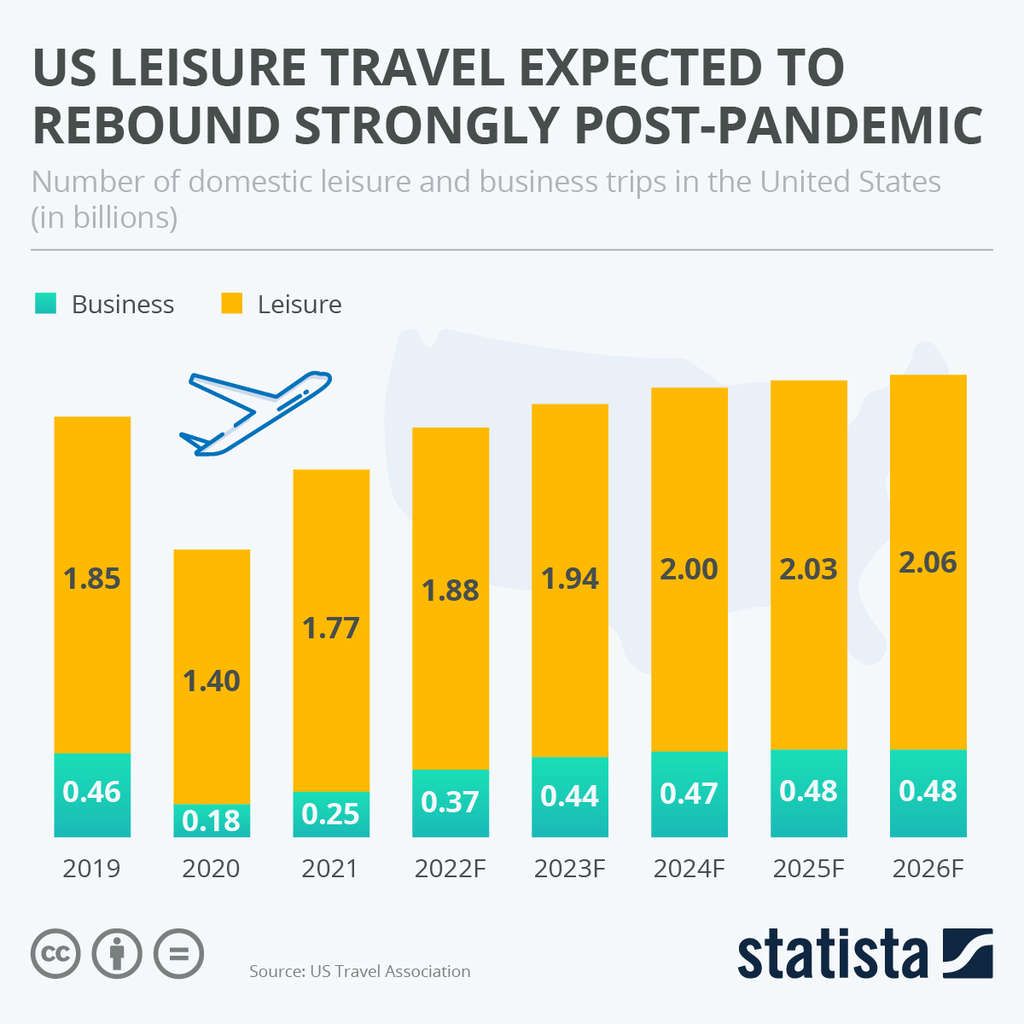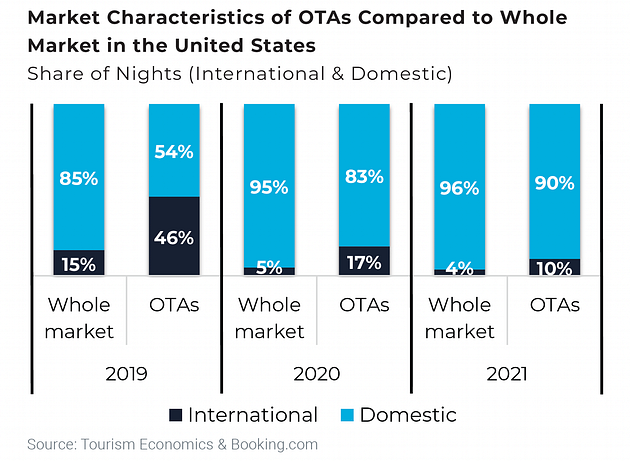The US lodging market is iconic. It’s 1950’s motels lining empty desert roads, sun-soaked Miami seaside resorts, old-world luxurious with park views and rather more apart from. No surprise the US is the world’s largest tourism market and its third most visited vacation spot.
Even after 3 years of pandemic shutdowns and restrictions, hospitality entrepreneurs stay resilient. Attributable to growing client demand, many expect 2023 to be their greatest 12 months but. The market stays dynamic and various, offering an unprecedented mixture of lodging choices for keen vacationers. Whether or not on the lookout for the facilities of a series resort, the individuality of a boutique property, or the native really feel of a trip rental, there’s really one thing for everybody.

small and mid-sized properties battle to match the main manufacturers in relation to advertising spend and attain
As we see in nearly all sectors, nonetheless, the US lodging market is present process a strategy of “chainification.” Simply as you can take pleasure in the identical burger in Honolulu or Boston, so too may you discover an nearly an identical resort expertise. Current estimates present that branded properties make up greater than seven in 10 inns within the US. This pattern was exacerbated by the pandemic, when vacationers gravitated towards the perceived security of well-known manufacturers. In response to Tourism Economics, 29% of US resort visitors stayed at unbiased inns in 2021, in comparison with 46% in 2019.
A combined market of chain and unbiased inns is the aim, however usually unbiased inns are at a structural drawback that makes it tough to compete.
A number of components could possibly be at play. For one, small and mid-sized properties battle to match the main manufacturers in relation to advertising spend and attain. Sole proprietors and hospitality entrepreneurs alike have restricted sources (and there are such a lot of hours within the day!), thus, they have to prioritize. Understandably, visitor experiences and facilities will usually trump the necessity for income administration programs or analytics, for instance.
A combined market of chain and unbiased inns is the aim, however usually unbiased inns are at a structural drawback that makes it tough to compete. Whereas there’s a place out there for all resort sorts, and chains have their advantages (familiarity, consistency, worth), we’re starting to see a lopsided market. Right here we deal with the US market, however it is a phenomenon that we see the world over. Within the UK and Eire, as an example, the marketplace for unbiased inns shrank by roughly 12% between 2010 and 2019.
On-line platforms can assist to handle the imbalance, empowering small and unbiased properties to take care of or enhance their competitiveness. There are three key areas to contemplate:
- Quantity, attain and visibility
- Comparability purchasing and upselling
- Information and forecasting
Quantity, attain and visibility
On-line journey companies (OTAs) course of thousands and thousands of bookings from the world over every day. Like branded inns, they’re trusted names who vacationers know they will depend on. For unbiased inns, this name-recognition might be helpful in reaching clients who’re probably exterior of their typical sourcing market.
Whereas, in response to Phocuswright, on-line platforms signify simply one-fifth of complete bookings — offline journey companies, offline direct (walk-in/cellphone) and on-line direct (web sites/apps) representing the bulk — they will appeal to visitors who’re maybe unfamiliar with their vacation spot or who will profit from options corresponding to automated web site translation, 24-hour buyer assist or frictionless cost choices. As Peter O’Connor, Professor of Technique on the College of South Australia Enterprise Faculty, explains:
“OTAs… cut back the technical and administrative hurdles of on-line distribution, taking good care of points corresponding to translation, bank card processing and search engine advertising.”

Whereas COVID-19 and subsequent restrictions impacted demand from worldwide vacationers, that’s all about to vary. In response to Tourism Economics, 46% of on-line platform room nights had been from worldwide vacationers within the US in 2019. Though that proportion shrank to 17% in 2020, worldwide borders reopening means numbers have come roaring again. The Nationwide Journey and Tourism Workplace (NTTO) forecasts 11 million extra passengers getting into the US in 2023 in comparison with the prior 12 months, reaching 62.8 million guests. On-line platforms can assist join these travel-hungry worldwide visitors with their good match within the US journey market.
Comparability purchasing and upsell
As proven within the Phocuswright’s US Shopper Journey Report 2022, most customers of a web-based journey platform should not fully loyal to a specific resort model and are continuously on the lookout for one of the best worth and site for his or her wants. Vacationers use digital platforms as a result of they’re handy, simple to make use of, and sometimes supply one of the best worth. For no upfront value (no payment is taken till after a room is bought), unbiased properties, who select to associate with on-line platforms, can get world visibility together with the worldwide chains as vacationers put collectively the itineraries for his or her journeys.
No loyalty program? No drawback. Whereas most chain inns supply loyalty applications that reward frequent vacationers (with factors for future journey or different perks), most unbiased lodgings select to not, because it will not be sensible for a property of their dimension. On-line journey companies, nonetheless, have their very own choices to draw repeat utilization, which advantages each resort companions and shoppers. Such applications have grown considerably over the previous few years: Now one in 5 vacationers take part in a single.
A current evaluation indicated that on-line journey company participation boosts profitability and proves “internet optimistic” for inns, notably for smaller properties that are typically owned and managed by a sole proprietor.
A former Professor of Advertising and marketing at Cornell’s Faculty of Lodge Administration, Invoice Carroll makes a convincing argument that on-line journey agenciesgenerate worth for associate properties of all sizes by delivering incremental clients (e.g. with no model loyalty) whom these inns would, in any other case, be unlikely to get.
Information and forecasting
Whereas chains have made large investments in expertise powering income administration, personalization and forecasting, many unbiased properties don’t have that luxurious. In response to a current OTA Insights survey of unbiased hoteliers, many inns are nonetheless missing programs for pricing, advertising and distribution. Almost half wouldn’t have a income administration system and roughly three quarters wouldn’t have a advertising platform.
As an alternative, small and mid-sized properties could make use of the information and analytics options supplied at no cost by their on-line companions, giving them visibility into client preferences and future demand, to assist them make knowledgeable choices round pricing or allocating stock. In response to Mr. Carroll, “Lodges can use [online travel agency data] to raised consider the influence of their OTA partnerships and make higher choices relating to charges and promotions, shifting incremental demand because the market fluctuates.”
A stage enjoying area
On-line journey companies empower small and mid-sized unbiased lodging suppliers in want of better visibility, and, in response to current analysis, the advantages outweigh the transaction prices. A current evaluation indicated that on-line journey company participation boosts profitability and proves “internet optimistic” for inns, notably for smaller properties that are typically owned and managed by a sole proprietor. A Tourism Economics evaluation of on-line journey company influence on common every day charge (ADR) by phase additionally discovered a stronger relationship between on-line journey company utilization and ADR for unbiased inns over chain properties.
The underside line is that within the US, the place unbiased properties are within the minority and sometimes at a structural drawback, on-line journey platforms are more and more helpful to succeed in world buyer base. Impartial properties have a lot of methods to promote their rooms; what on-line platforms signify are a device with which to leverage further stays and interact clients who could in any other case could not have discovered them. The tip consequence? Completely satisfied visitors, comfortable suppliers, and a journey market that retains its singular attraction.



